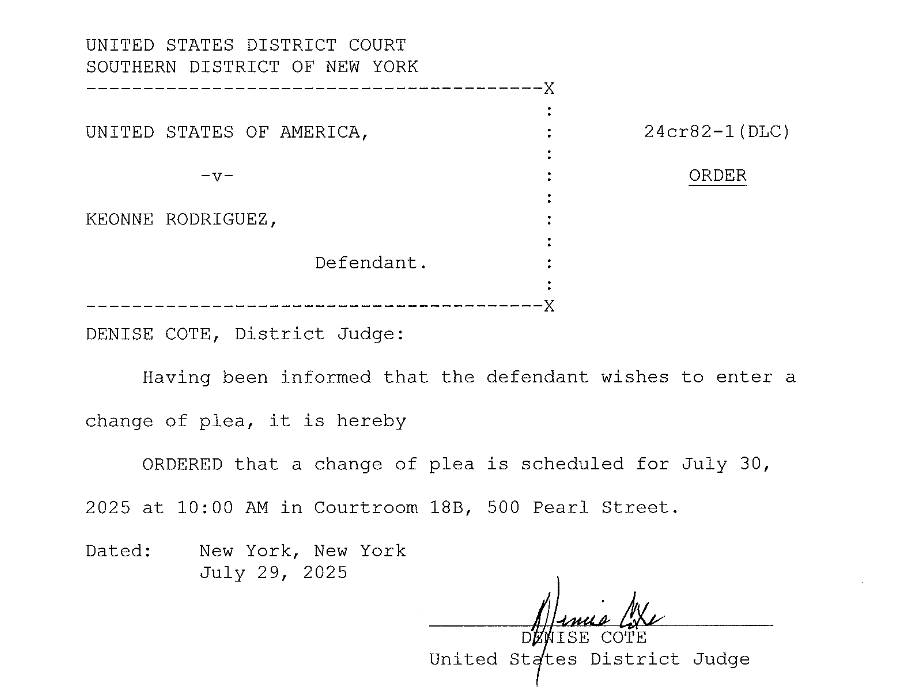Samourai Wallet co-founders to now plead guilty to US charges
Samourai Wallet co-founders Keonne Rodriguez and William Lonergan Hill have said that they now wish to plead guilty to charges stemming from their involvement in the crypto mixing protocol.
Separate filings on behalf of Rodriguez and Hill were made in a New York federal court on Tuesday, which said the duo would change their pleas before the court on Wednesday morning.
The pair pleaded not guilty to charges in April 2024 for running what prosecutors alleged to be an unlicensed money-transmitting business that processed over $2 billion worth of unlawful transactions, including some tied to illicit online marketplaces like Silk Road.

Document on behalf of Keonne Rodriguez reflecting his change in plea. Source: CourtListener
Samourai co-founders face 25-year prison sentence
Rodriguez, Samourai’s CEO, and Hill, its chief technology officer, were charged with conspiracy to commit money laundering, which carries a maximum prison sentence of 20 years.
The pair were also charged with operating an unlicensed money-transmitting business, which carries a sentence of five years, meaning they could face a maximum of up to 25 years behind bars.
Judge Denise Cote scheduled hearings to discuss the change in pleas for Wednesday morning. The document didn’t provide additional details on how the plea change may impact their sentences.
A trial for the pair was set to start on Nov. 3.
Samourai co-founders tried to toss the case
The change in pleas came nearly four months after the pair tried to dismiss the case in early April, pointing to an April 7 memo from Deputy Attorney General Todd Blanche that said the Department of Justice wouldn’t prosecute those behind crypto mixers for “unwitting violations of regulations.”
A month later, Samourai’s lawyers alleged that federal prosecutors suppressed advice that the company didn’t need a money transmitting license six months before the founders were eventually charged.
Neither attempt to sway the prosecutor’s case was effective.
Samourai worked similarly to other crypto mixer protocols, taking funds from multiple users and blending them to hide their origins.
Guilty pleas come amid Roman Storm’s trial
Another crypto mixer under the spotlight is Tornado Cash, with one of its creators, Roman Storm, currently being tried before a jury.
Storm’s backers say an unfavorable outcome in the case could establish a precedent for criminalizing open-source privacy tools, posing a serious risk to decentralized finance innovation while significantly restricting privacy rights.
Storm was charged with conspiracy to commit money laundering and sanctions violations in 2023. If convicted on all counts, Storm could face up to 45 years behind bars.
Disclaimer: The content of this article solely reflects the author's opinion and does not represent the platform in any capacity. This article is not intended to serve as a reference for making investment decisions.
You may also like
After bitcoin returns to $90,000, is Christmas or a Christmas crash coming next?
This Thanksgiving, we are grateful for bitcoin returning to $90,000.

Bitcoin security reaches a historic high, but miner revenue drops to a historic low. Where will mining companies find new sources of income?
The current paradox of the Bitcoin network is particularly striking: while the protocol layer has never been more secure due to high hash power, the underlying mining industry is facing pressure from capital liquidation and consolidation.

What are the privacy messaging apps Session and SimpleX donated by Vitalik?
Why did Vitalik take action? From content encryption to metadata privacy.

The covert war escalates: Hyperliquid faces a "kamikaze" attack, but the real battle may have just begun
The attacker incurred a loss of 3 million in a "suicidal" attack, but may have achieved breakeven through external hedging. This appears more like a low-cost "stress test" targeting the protocol's defensive capabilities.

